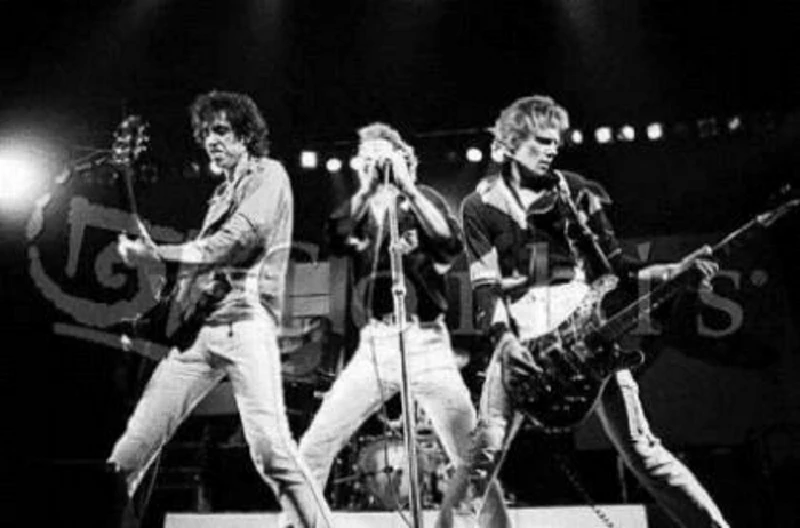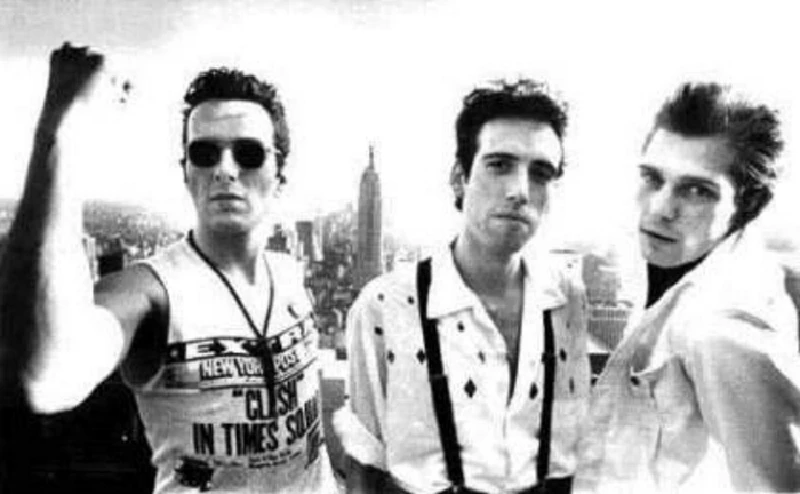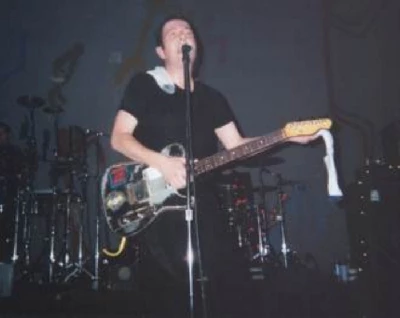Joe Strummer - A Life 1952-2002
by Denzil Watson
published: 16 / 1 / 2003

intro
Long term Clash fan Denzil Watson looks back and reflects upon on the extraordinary life and the untimely death of Joe Strummer
While a whole nation remembers where they were when they first heard about the unexpected death of Lennon or Cobain, so too will all thirty something ex-punks when they heard the news break of the untimely death of Clash front man, Joe Strummer. I certainly can. I was in Virgin Records in Sheffield when the news came over the in-house radio station. I just simply couldn't believe what I was hearing. I ran to the nearest payphone to ring my best mate and life long Clash fan Richard. Sure enough it was true. Strummer was dead. Richard had been frantically ringing me to tell me the news. I remember a couple of days later sitting in my local Safeway cafe with tears rolling down my cheeks as the sense of loss began to set in, having just read Strummer's obituary in the paper. Then my mind turned to regret. A few weeks earlier I'd passed up on the chance to see Strummer and the Mescaleroes at the Sheffield Leadmill, selling my ticket to a friend so I didn't miss band practice. Now Strummer's passing has sunk in the sense of loss has only grown. Strummer was a one-off. Without Strummer and the Clash punk would have been as Billy Bragg so eloquently put it in one of the many glowing tributes "just a sneer, a safety pin and a pair of bondage trousers". While the Sex Pistols, the band that finally persuaded Strummer to quit pub rockers the 101ers, were rebels without a cause, the Clash certainly weren't. They were, arguably, the only truly political punk band. And while they didn't pretend to have all the answers they thrust numerous domestic issues, such as the lack of career opportunities in Thatcherite Britain, plus their anti-racism and anti-fascist lobbies together with a whole host of more world widely issues ('I'm so bored with the USA') under our noses. The Clash were also punk rock's great innovators - bringing the influence of reggae music into their sound from the beginning. Even their eponomously-titled debut LP, still sounding every bit as fresh as it did back then in 1977, featured a cover version of Junior Murvin's 'Police and Thieves". And which other punk band could have come up with the idea of releasing a triple album for the price of a single LP? The Clash did in the form of 1981's 'Sandinista', much to the horror of their record label CBS. The band declared it was a thank you to the fans, appeasing CBS by waiving all their royalties. They didn't always make perfect records - 1978's "Give 'Em Enough Rope" was rather lacklustre while 1985's 'Cut the Crap' post guitarist Mick Jones's sacking was a bit of an embarrassment to the band's otherwise untarnished name. They did, however, record punk's most vital debut LP on a shoe string budget and went on to release the best double album of all time in the form of 'London Calling'", seamlessly fusing together such diverse influences as reggae (again), white-boy funk, jazz and good old-fashioned rock'n'roll. Ask any rock journalist worth his or her salt and at least one of the two will feature in their all-time best-of list. While the Clash were always the last gang in town, their trump card was to have someone of Strummer's vision at their helm. His sharp sense of political nouse and acute awareness of his surroundings always got articulated through his song writing partnership with Mick Jones, and to such an extent that Strummer/Jones are considered by many to be the Lennon/McCartney of the punk generation. Strummer also possessed an unrivalled gift for sloganeering, many of which adorned the DIY clothing the band donned in their early days (a trick lifted lock, stock and barrel almost a decade later by the Manic Street Preachers). In the current climate of overblown pop stardom and celebrity Strummer was a breath of fresh air. If ever there was a man of the people then Strummer was it. Articulate, iconic but never aloof, he always took time out to talk to the fans at length about issues or just gracefully receive "you changed my life" style accolades, both before gigs and afterwards back at the band's hotel. He was a man of boundless energy and enthusiasm that never lost touch with the people that bought the records and put the Clash up where they were. He was one of us. Strummer was equally loved by music journalists and photographers alike. Few bands have ever looked as good as the Clash did. As a front man Strummer never looked less than sensationally photogenic. He was a journalist's dream - able to talk with passion at length about an array of topics in his highly informed growl, delivering the very quotes that music journalist's career's depend upon with unassuming ease. Take for instance the following quote from the interview he gave for the retrospective documentary on The Clash,'Westway to the World'. "It seems to me that origination is instinct not intellect". Strummer also was also a man of integrity. How many people would have refused the weight of the wad being dangled in front of him as bait to reform The Clash? Probably not too many (the Sex Pistols certainly didn't). Ever the man of principle, he was more concerned about not tainting the Clash's memory, preferring to pursue his own musical vision with his band, the Mescaleroes. Even to the end he walked it like he talked it. Not that he turned his back on his Clash days completely. He spent many a painstaking hour selecting and producing tracks for the Clash's retrospective live album 'From Here to Eternity'. Meanwhile his current day Mescaleroes set always featured some of the more obscure Clash numbers (the cover of Willie William's 'Armagideon Time', 'Police on my Back', and '"Rudie Can't Fail' to name a few) along side the more world music vibe of his solo stuff. And so to the sense of irony surrounding both the nature and timing of Strummer's death. How many bookies would have offered shorter odds for Strummer passing away than friend and Pogues lead singer Shane McGowan or Clash drummer Topper Headon? Probably not too many. A few weeks previously Mick Jones joined Strummer and The Mescaleroes on-stage for the first time since 1983 at a Fire-fighter's benefit show at Action Town Hall in London for a run through some old Clash favourites. Given the band were also planning a one-off reunion for their induction into rock's Hall of Fame who knows what might have followed. The January issue of 'Uncut' magazine also rather untimely featured a multiple page feature on the making of the Clash's debut LP including one of the last interviews Strummer gave before he died. How ironic then that such an extraordinary man should die in such an ordinary manner, suffering a heart attack after walking his dog. But while John Mellor may have died on December 22nd, Joe Strummer certainly didn't. The diplomat's son that gave us all-time classics such as 'White Man in Hammersmith Palais', '"London Calling' and '"Complete Control' will pass into the realms of punk folklore and legend, living on through the music he left behind. We'll never forget you Joe.
Picture Gallery:-




live reviews |
|
London HMV Oxford Street, 16/7/2001 |

|
| I never got the Clash at all, I'm afraid. But in these days now, when indie has got somewhat boring, it's worth checking out the old chaps to see if they can still cut it in the Y2K. As I said, I never got the Clash but they never pissed me off either. Wa |
most viewed articles
current edition
Carl Ewens - David Bowie 1964 to 1982 On Track: Every Album, Every SongBathers - Photoscapes 1
Colin Blunstone - Thalia Hall, Chicago, 16/7/2025
John McKay - Interview
Armory Show - Interview with Richard Jobson
Visor Fest - Valencia, Spain, 26/9/2025...27/9/2025
Billie Eilish - O2 Arena, London, 10/7/2025
Bathers - Photoscapes 2
Editorial - July 2025
Sir Tim Rice - Interview
previous editions
Heavenly - P.U.N.K. Girl EPOasis - Oasis, Earl's Court, London, 1995
Trudie Myerscough-Harris - Interview
Pixies - Ten Songs That Made Me Love...
Simon Heavisides - Destiny Stopped Screaming: The Life and Times of Adrian Borland
Beautiful South - Ten Songs That Made Me Love...
Prolapse - Interview
Boomtown Rats - Ten Songs That Made Me Love....
Blues and Gospel Train - Manchester, 7th May 1964
Donovan - Ten Songs That Made Me Love...
most viewed reviews
current edition
Amy Macdonald - Is This What You've Been Waiting For?Sick Man of Europe - The Sick Man of Europe
Alice Cooper - The Revenge of Alice Cooper
Phew, Erika Kobayashi,, Dieter Moebius - Radium Girls
Lucy Spraggan - Other Sides of the Moon
Blueboy - 2
Cynthia Erivo - I Forgive You
Davey Woodward - Mumbo in the Jumbo
Lapsley - I'm a Hurricane, I'm a Woman In Love
Philip Jeays - Victoria
Pennyblackmusic Regular Contributors
Adrian Janes
Amanda J. Window
Andrew Twambley
Anthony Dhanendran
Benjamin Howarth
Cila Warncke
Daniel Cressey
Darren Aston
Dastardly
Dave Goodwin
Denzil Watson
Dominic B. Simpson
Eoghan Lyng
Fiona Hutchings
Harry Sherriff
Helen Tipping
Jamie Rowland
John Clarkson
Julie Cruickshank
Kimberly Bright
Lisa Torem
Maarten Schiethart